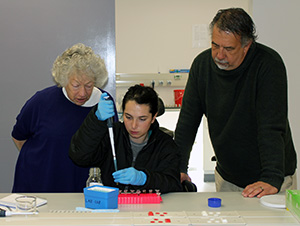Latest News Archive
Please select Category, Year, and then Month to display items
01 March 2023
|
Story Alicia Pienaar
 Prof Mathys Labuschagne is the Head of the Clinical Simulation and Skills Unit within the School of Biomedical Sciences in the Faculty of Health Sciences
Prof Mathys Labuschagne is the Head of the Clinical Simulation and Skills Unit within the School of Biomedical Sciences in the Faculty of Health Sciences
The Dean of the Faculty of Health Sciences, Prof Gert van Zyl, invites you to the inaugural lecture of Prof Mathys Labuschagne, Head of the Clinical Simulation and Skills Unit within the School of Biomedical Sciences in the Faculty of Health Sciences.
Subject: Clinical Simulation: Quo Vadis?
Venue: Auditorium, Equitas Building, Bloemfontein Campus
Date: 8 March 2023
Time: 17:30
RSVP on or before Friday 3 March 2023
Light refreshments will be served after the inaugural lecture.
About Prof M Labuschagne
Prof Mathys Labuschagne is the Head of the Clinical Simulation and Skills Unit within the School of Biomedical Sciences in the Faculty of Health Sciences at the University of the Free State. He completed his MB ChB degree and qualified as an ophthalmologist in 2006.
He developed an interest in health professions education and obtained a PhD in Health Professions Education in June 2012. The title of his thesis was: Clinical Simulation to enhance undergraduate medical education and training at the University of the Free State.
Prof Labuschagne was appointed Head of the Clinical Simulation and Skills Unit at the University of the Free State. The facility is utilised for undergraduate and postgraduate clinical simulation training, as well as interprofessional training and research. He has a special interest in simulation as training tool, precision skills training, and mastery of learning and simulation as tool to prepare students for interprofessional education and collaborative practice.
Prof Labuschagne is part of a multi-institutional consortium that developed the MySkills Medic app. It is a clinical procedural skills application aimed at graduating medical students, interns, and community-service doctors. He was appointed as a member of the Ophthalmology Foundation Education Simulation Subcommittee (affiliate of the International Council of Ophthalmology) tasked with developing a white paper to guide simulation training for ophthalmologists. He is involved in postgraduate supervision for master’s and PhD students in HPE.
Monkey research attracts international attention
2016-07-11

Prof Trudy Turner from the University of
Wisconsin-Milwaukee and Prof Paul Grobler
from the Department of Genetics at the
University of the Free State, together with one
of the students researching monkey genes.
Photo: Siobhan Canavan
For this year’s Summer School programme, Prof Paul Grobler, from the University of the Free State Department of Genetics focuses on research about the conflict between monkeys and humans in areas where monkeys are regarded as problem animals.
Global expert part of research
This year, Prof Grobler is hosting a group of students and lecturers from the United States of America (USA). The group includes Prof Trudy Turner from the University of Wisconsin-Milwaukee (UWM), a global expert on vervet monkeys. She has been working with the Department of Genetics at the UFS for the past fifteen years, and has also been appointed as an Affiliated Professor in the department.
“The Summer School programme is an opportunity for the American Primatology students to gain practical experience in Africa,” says Prof Grobler.
International interest in Summer School
This year’s Summer School programme involves four lecturers and nine students. The lecturers are from the University of Wisconsin-Milwaukee (UWM), the University of California, Los Angeles (UCLA), Boston University, and Central Washington University.
“We use the genetic information to determine
how monkeys historically infiltrated the
different areas in South Africa.”
This year’s focus is on the genetic structure of the monkeys in South Africa, and research that is being done on the differences and similarities in monkeys from different areas. “We use the genetic information to determine how monkeys historically infiltrated the different areas in South Africa,” says Prof Grobler.
Local nature reserve acting as host
The group will perform field work, including observing monkeys in the Soetdoring Nature Reserve, as well as laboratory work in the department, where they will be assisted by two laboratory technicians.
Two years ago, Prof Grobler and his department tested this idea on a smaller scale, and now they hope to make this a regular event.